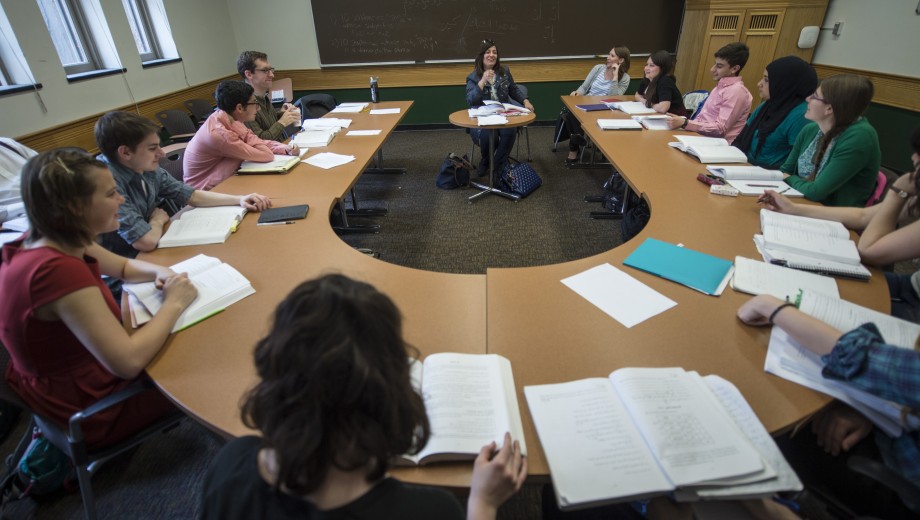Why should—and why do—people learn the languages you teach?
Noha Forster: Over 300 million people claim Arabic as their native language; beyond that, it’s known to Muslims because it is the liturgical language of Islam. I’ve had students who graduate and tell me that they were immediately given a higher salary simply because they knew Arabic, so in the job market it’s quite lucrative. There’s also great interest on the part of the US government for people to learn Arabic, and this interest filters down to students in the form of scholarships at the high school and university levels.
Whitney Cox: I always say you should study Sanskrit because it will make your life better. The grammar and many of the most important thinkers make Sanskrit humanity’s greatest collective reflection on the nature of language itself. Admittedly, I’m biased. People actually come to study Sanskrit because of its association as a scriptural language for Hinduism and Buddhism. A lot of my students are master’s students in the Divinity School. Increasingly, I get South Asian American College students who want to learn about their own or their parents’ culture.
Alice McLean: I’ve had students who only wanted to learn French so they could read Proust. I’ve had other students who are not interested in literature, but in traveling and in using their French to discover other cultures. Many College students are simply fulfilling their competency requirements; they have to have a year of language and knowledge of another culture. We also teach a considerable proportion of students who study abroad—230 students this past year went to Paris, nearly half of the 500 or so students who go abroad each year.
Ana Maria Lima: We have a lot of heritage students in Portuguese classes who are from Brazilian or Portuguese families. They speak the language but cannot write or read properly. They take Portuguese so that they can be fluent, go to Brazil, and function in the language the way they think they should. We have graduate students in Divinity, Anthropology, and History who need the language to do research. And we have Spanish speakers who want to learn Portuguese because it expands their employability—students in economics, law, and business who want to work in the Latin American market.
What’s new in language study for graduate students?
AML: At UChicago, graduate students and undergraduates are all mixed in languages classes—we don’t separate them.
AM: That is true, although this summer we began offering a new, five-week class solely for graduate students, called Reading French for Research Purposes, through the Summer Language Institute at UChicago. It is patterned after a popular German course that has been offered for a while. A similar course in Modern Hebrew was offered for the first time this summer as well.
The aim is not for students to learn how to speak the language, although they do read it out loud. Their goal is to become proficient enough to read and translate academic articles in their field. Reading proficiency used to be demonstrated mainly through translation exams, but the emphasis in academia is shifting to reading comprehension, so our course has changed accordingly to help students prepare for either type of exam. And some departments simply accept passing this course with a high enough grade as proof of students' ability.
The class meets as a group twice a week, and students come to me for individual tutorials about once a week with an academic article they have selected from their field of study. We go through it together and they practice translating; they bring up any questions or difficulties. I feel like I get to witness a minor miracle, as students realize how French is put together through multiple subordinate clauses, for example, and as they see each linguistic point we have been learning in class come alive on the written page. After five weeks they really can sit down and work through an article. For an instructor, this rapid progress, and for a worthy cause, is very exciting to watch.



Add new comment